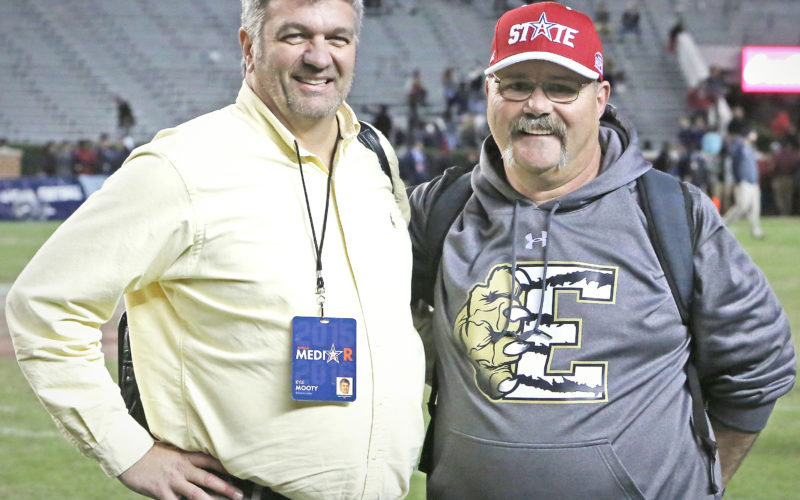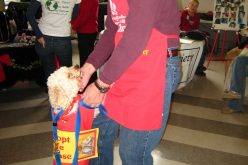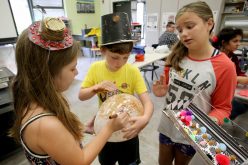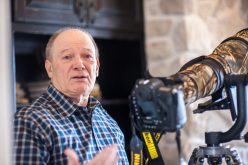BECCA MARTIN-BROWN
bmartin@nwadg.com
“When I started at the Northwest Arkansas Times fresh out of Fayetteville High in 1980 — Grant Hall hired me — I thought I had the greatest job in Fayetteville outside of Eddie Sutton and Lou Holtz,” says longtime journalist and now author Kyle Mooty. “I think I made something like $14,000, but I was rich!”
Mooty came by his passion naturally.
“My father had been a college basketball player and head coach at Centenary in Shreveport, La.; one of my brothers played baseball at Alabama; my other was the 1976 Open Class state motocross champion in Alabama; and my sister played college field hockey,” he relates.
Mooty says he stayed in sports writing for 18 years before moving on to management in newspapers, magazines and radio stations in seven states. He’s now editor and general manager of the Enterprise Ledger and general manager of the Eufaula Tribune in Eufala, Ala., and the author of “New Set of Downs: How Johnny Dyess Fought off His Greatest Would-Be Tackler and Returned to Winning Ways.” He’ll speak and sign books from 2 to 4 p.m. Aug. 12 at the Fayetteville Public Library, but he took a few minutes to answer some questions for What’s Up! prior to his visit home.
Q. Who is Johnny Dyess as far as Northwest Arkansas audiences are concerned?
A. Johnny is a guy I met while doing a series on meth, as I’ve done in almost every town I’ve been in with newspapers. He was from the small south Alabama town of Elba. He played four years for the legendary Paul “Bear” Bryant as a walk-on at Alabama, following in the footsteps of his uncle Marlin “Scooter” Dyess and cousin Johnny Sharpless. The Crimson Tide won national championships during Johnny’s freshman and sophomore seasons, and they only lost five games in his four years — 1978-81 — in Tuscaloosa, but the only ring he wears from his ‘Bama days today is the one commemorating Bryant’s 315th win. He had obviously been a small town star player and wanted, despite the fact he wasn’t big enough to be a star at Alabama, so badly to play for the Tide and Coach Bryant. By the way, his second sophomore season was capped off with a win over Lou Holtz and Arkansas at the Sugar Bowl on New Year’s Day of 1980.
Q. How did you get interested in his story?
A. The chief deputy of the Coffee County Sheriff’s Department set me up to talk with Johnny. I’ve worked now for 38 years and in seven states in the media, and hardly anything drops my jaw anymore. But I sat and just said, “WOW,” for two or three hours as Johnny spilled his heart to me.
After doing a feature on him, I just knew I had to approach him about a book.
Interesting note: After doing the feature on Johnny, he began getting a few speaking engagements at churches and schools. Then, the Alabama Family Law Retreat asked him to be one of its two guest speakers along with Rudy Ruettinger, the famous walk-on of Notre Dame football lore. A judge told me afterwards that Johnny had been the star of the night.
Q. What deeper story do you think this book tells in such a turbulent national time?
A. The book may appear to be about sports/football, but I was told by the publishing company that I was probably three words away from it being classified Christian. Yes, he played football, and that is important to the overall story, but Johnny’s message is faith. He always talked about how having faith in something as small as a mustard seed can move mountains. He had been to two or three rehabs previously but was back into the drug world soon after getting out. The faith-based rehab is what saved him. In fact, he doesn’t refer to it as a rehab center, rather a life restoration center.
__
FAQ
Book Talk:
Kyle Mooty
WHEN — 2 p.m. Aug. 12
WHERE — Fayetteville Public Library
COST — Free; books will be available for purchase
INFO — faylib.org










